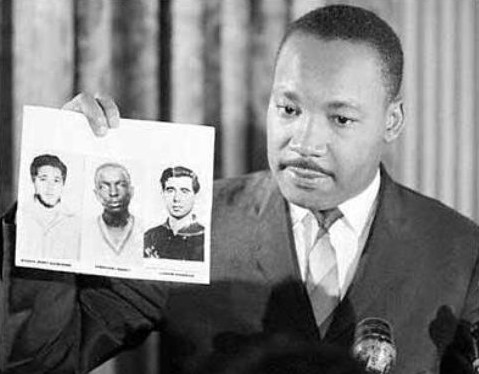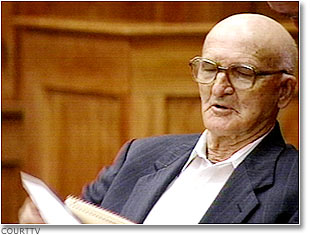Andrew "Andy" Goodman, a 20-year-old student at Queens College
in New York, was only in Mississippi for one day before he was
killed. The New Yorker was among nearly 1,000 college students,
mostly white, who signed up for "Freedom Summer," a program by
civil rights groups to register Mississippi blacks to vote.
After a training program in Ohio, he drove with Michael
Schwerner and James Chaney to Meridian, arriving the evening of
June 20, 1964. His first assignment was to accompany his
coworkers as they investigated a church burning in Neshoba
County.
He never
returned.

Before coming to Mississippi, Michael Schwerner, 24, was a
social worker in Manhattan. Schwerner, who was from a Jewish
family, told people he was an atheist. He and his wife Rita took
positions with the Congress of Racial Equality, organizing a
boycott of a store that refused to hire blacks and setting up a
community center. Schwerner immediately earned the enmity of the
Ku Klux Klan, which gave him the code name "Goatee." According
to a witness, Schwerner tried to reason with the Klansmen who
killed him, saying to a man aiming a gun at him, "Sir, I know
just how you feel."

James Chaney was 21 years old and a new father on June 21, 1964.
The only native Mississippian of the victims, Chaney grew up in
Meridian, the eldest of five children. He began working for the
Congress of Racial Equality as a volunteer and later the
Schwerners pushed for him to be hired as a paid staff member. He
was behind the wheel of the CORE station wagon when deputies
stopped the civil rights workers. According to witnesses, he was
the last to be shot.


FBI agents took the lead in investigating the disappearances
because local law enforcement agents were unwilling to do so
and, in some cases, were under suspicion. Federal agents
questioned Klan members and helped organized searches of swamps
and fields near Philadelphia. The FBI men paid Klan informants
thousands for their cooperation and the accounts of those
informants were the heart of the federal civil rights case
brought against 18 men in 1967.

Federal and state investigators as well as Navy recruits combed
snake-infested swamps for signs of the missing civil rights
workers. Forty-four days after they vanished, a tip led to the
discovery of their bodies at the base of an earthen dam near
Philadelphia, Mississippi.

The blue station wagon driven by the trio was recovered in a
swampy area north of Philadelphia two days after they vanished.
The vehicle, owned by the Congress of Racial Equality, had been
set afire.

In 1967, 18 men, including Killen (at left) and Neshoba County
Deputy Cecil Price, stood trial on federal civil rights charges.
Price was convicted, but Killen walked free after the jury
deadlocked 11 to 1 in favor of conviction. The holdout juror
said she could not convict a preacher.

In the wake of the murders, Philadelphia, Mississippi became
synonymous with racial violence. Federal prosecutors pursued
civil rights charges in Meridian, but local prosecutors did not
bring murder charges. A year after the murders, some 60 marchers
marked the anniversary by marching to the site of the church
burning that brought Chaney, Goodman and Schwerner to Neshoba
County.

In 1999, state investigators reopened the murder case after a
Klansmen serving a life sentence for another racial murder gave
an interview to a state archivist in which he implicated Killen
as the ringleader. A grand jury indicted 79-year-old Killen,
seen here in his booking photo, in January 2005.

Killen, still working as a preacher and sawmill operator, denied
he was involved in the slayings or ever belonged to the Klan,
but expressed sympathy for those that carried out the murders.
"I'm not going to say they did anything wrong,"
he said.

Killen, seen here after his release from Neshoba County
Detention Center on $250,000 bail, insists he did not even know
of Michael Schwerner's existence before the disappearance of the
civil rights workers made headlines.

A lawyer for Killen says his defense will consist of character
witnesses, including fellow Baptist ministers. The defense also
plans to attack testimony from Klan informants, saying the FBI
bought their accounts with thousands of dollars in government
payouts.


Killen's trial opened one week before the 41st anniversary of
the deaths. Lawyers were only permitted 15 minutes to present
opening statements to the panel of 13 whites and four blacks.
Defense lawyer Mitchell Moran told the jury his client was a
low-level member with no control over the Klan's activities.
State Attorney General Jim Hood acknowledged that Killen did not
shoot the men himself, but said Killen's role as organizer made
him just as guilty as those who fired the guns.

Circuit Court Judge Marcus Gordon halted the trial on its first
day after the 80-year-old defendant was rushed to the hospital
with tightness in his chest and high blood pressure. The recess
came moments after the prosecution's first witness, the widow of
Michael Schwerner, had finished her emotional testimony.

The ailing defendant listened as the jury announced they were
split 6-6 after less than three hours of deliberations. They did
not specify what they were divided on, but said they did not
think further deliberations would make a difference. Even so,
Judge Gordon dismissed them for the evening on June 20, 2005.

The jury returned to deliberate on the 41st anniversary of the
deaths and convicted Killen of three counts of manslaughter.

Killen's wife, Betty, hugged him after the verdict was
announced. She missed a chemotherapy appointment for breast
cancer treatment to attend the proceedings.
Killen's
sentencing was set for June 23.

As Killen was placed into custody, he pushed away microphones
from reporters asking him for comment.





















